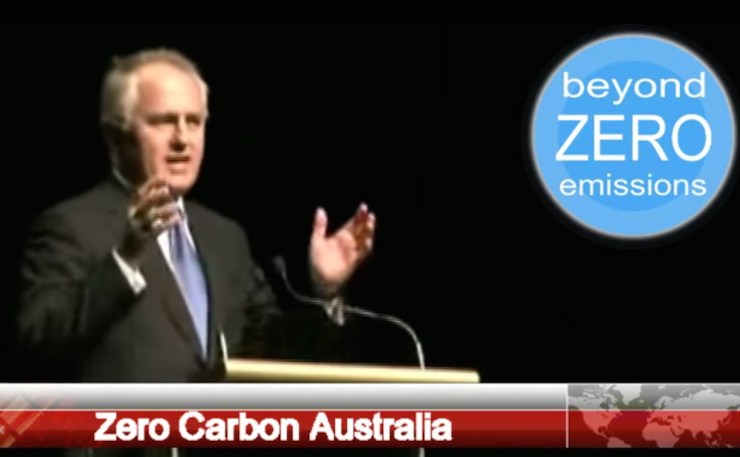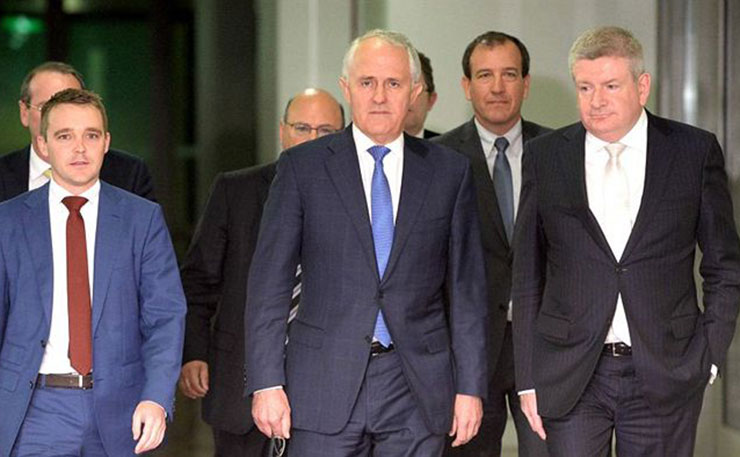In 2010 Turnbull helped launched a report calling for a zero emissions future. He understands the threat climate change poses, he just doesn’t seem to care anymore, writes Michael Brull.
When Malcolm Turnbull overthrew Tony Abbott as Prime Minister, it was immediately clear that he wouldn’t change our climate change policy. Once he warned about the Liberals announcing an “environmental figleaf to cover a determination to do nothing”, now he recognised the Direct Action Policy of Abbott’s Environment Minister Greg Hunt as “very well designed. It was a very, very good piece of work.” Turnbull intended to be a more sophisticated salesperson of Abbott’s policies, and that’s what we’ve gotten.
In Parliament on Tuesday Greens MP Adam Bandt asked Turnbull about the Carmichael mega-mine to be built in Queensland. Perhaps a little incoherently, Bandt repeated his request for the government to provide him with figures on greenhouse gas emissions of the Carmichael mine, before asking if he hadn’t been given them yet because it was embarrassing that the mine “alone would generate more pollution than the entire European Union does in one year”.
Turnbull rose with the combination of smugness and charm that has won him so many admirers and resentful critics. The PM breezily responded that he could “send him some numbers” if that’s what Bandt would like, though “I’m sure he can do them himself”. Turnbull then explained
“What the Honourable Member overlooks is that Australia is taking to the Paris conference of the parties very credible and substantial emissions targets. … Our cuts of 26 to 28 percent reduction from 2005 are very substantial. And when they are measured on a per capita basis, which is the only way they can reasonably be compared to other countries, they are second only to the emissions cuts offered by Brazil.”
Turnbull then increased the baiting of Bandt, as appears to be customary in Parliamentary debates: “The honourable member hates coal, he really hates coal. Now, the reality is that coal is part of the energy mix of the world today, and will be for many decades to come.” Warming to the chance to demonstrate his mastery of detail and advocacy he threw around some factoids and declared that though coal would never be clean enough to satisfy the Honourable Member (snigger), Australian coal is “relatively clean”.
According to Greenpeace, Australia emitted over 550 million tonnes of carbon dioxide equivalent emissions in 2011. The use of passenger cars accounted for 41.9 million of these tonnes. The Carmichael mega-mine would emit over 120 million tonnes of carbon dioxide. It is pretty clear that we cannot cut emissions and let the mine go ahead. As New Matilda’s Thom Mitchell has documented, the mine has been beset with major difficulties, including the fact it seems financially unviable to the major banks.
Just as Malcolm Turnbull once explained that Tony Abbott’s climate change policy is bullshit, so must we explain that Malcolm’s (Abbott designed) climate change policy is bullshit. And the best way to do so is to turn once again to the eloquent arguments of Malcolm himself.
Back in June 2010, an organisation called Beyond Zero Emissions launched an important report. It announced on the front page what it was: a 10 year roadmap for 100 per cent renewable energy. Baseload energy supplied by renewable sources, and only $8 per household per week. The report was close to 200 pages, so they usefully provided a synopsis.
It explained why the goal was zero emissions:
“We know that climate change is a real threat, and we know what to do about it. The cause of the problem is that the level of atmospheric CO2 is already too high. For atmospheric CO2 to stabilise, human activities must stop emitting greenhouse gases‚ particularly from our use of fossil fuels for energy. The threat comes from dangerous ‘tipping point’ mechanisms, which can be triggered by excessive temperatures and would prevent us from returning to safe climate conditions. To avoid this threat, we need to reduce atmospheric CO2 from the present level of 390 ppm to well below 350 ppm‚ significantly closer to pre-industrial concentrations of 285 ppm. Evidence of a tipping point is the sudden decline in Arctic sea ice, which has accelerated beyond the worst-case forecasts of the IPCC … To avoid more severe risks, such as that presented by the melting of sub-artic permafrost, our path is clear – we need to attain a zero-emissions economy…”
And why aim at getting this all done in 10 years?
“The premise of a ten-year transition is based on ‘The Budget Approach’ from the German Advisory Council on Global Change. In order to have a 67 per cent chance of keeping global warming below 2oC above pre-industrial temperatures, on a basis of equal allocation of emissions on a per-capita basis, it would be necessary for the USA to reduce emissions to zero in 10 years. Australia has about the same per-capita emissions as the USA, and would need to pursue the same goal.”
The report provided what it describes as a:
“fully costed and detailed blueprint for transforming Australia’s energy sources to 100 per cent renewable supply. This is achievable using technology that is commercially available today, with no technical barriers to their deployment. Implementing the proposed infrastructure in ten years is well within the capability of Australia’s existing industrial capacity. The required investment is the equivalent of a stimulus to the economy of 3 per cent of GDP… Australia has some of the best renewable energy resources in the world, and should be positioning itself as a leader in the emerging renewable energy economy. What is required to make this happen is leadership from policymakers and society, with firm decisions made quickly that will allow this transition to occur…”
Those who read the original report will see pages 2-8 are entirely consumed by blurbs from various eminent figures and experts praising the study. One of the endorsements came from Malcolm Turnbull:
“I believe our long-term global goal is to very substantially reduce our emissions, a goal that will require almost all of our energy to be produced from zero or very near-zero emission sources… The work they [Beyond Zero Emissions and Melbourne Energy Institute] have done is important, it provides the most comprehensive technical blueprint yet for what our engineers, our scientists, can begin to do tomorrow.”
Malcolm was apparently so impressed by the report he helped launch it, together with Bob Carr and Senator Scott Ludlum.
There is even video footage of the launch, helpfully uploaded in September this year, along with a particularly salient excerpt of his speech in October. Also helpfully, Beyond Zero provided a transcript of the event at their website.

Here’s what Malcolm had to say on that cold winter’s night. He began by describing the:
“way we can move, as we must move, if we are to effectively combat climate change to a situation where all or almost all of our energy comes from zero or very near zero emissions sources. Now our response to climate change must be guided by science. The science tells us that we have already exceeded the safe upper limit for atmospheric carbon dioxide. We are as humans conducting a massive science experiment with this planet. It’s the only planet we’ve got.”
He also acknowledged:
“We are dealing in scientific terms with enormous uncertainty. There is a tendency for people to point to the forecasts for the future, sea levels, temperatures, other impacts of climate change and say oh well you know they’ve over egged the pudding a little bit, it’s probably going to be less dramatic than that. But we are dealing with uncertainty and it may well be and indeed there is considerable evidence, that it may well be that many of these forecasts that we’ve become so used to, in fact err on the conservative side. We are told that 2010 will be the warmest year on record since records began in the late eighteen hundreds. We know that the consequences of unchecked global warming would be catastrophic. We know that extreme weather events are occurring with greater and greater frequency and while it is never possible to point to one drought or one storm or one flood and say that particular incident is caused by global warming, we know that these trends are entirely consistent with the climate change forecasts with the climate models that the scientists are relying on.
“Just in the last month floods and landslides have killed thousands in Kashmir, Poland, Pakistan, Korea and China. Russia has lost at least 30 per cent of its grain crop due to the worst fires in that country’s history. Now sometimes the task of responding to the challenge of climate change may seem too great, too daunting.
“It is a profound moral challenge, because it is a cross generational challenge. We are asking our own generation to make decisions; to make sacrifices, to make expenditures today so as to safeguard our children, their children and the generations that come after them.
“It truly requires us to think as a species, not just to think as individuals. We are not, as Edmund Burke reminded us so many years ago, like flies of the summer that just come and go without any knowledge of what went before and what will come after. We as a human species have a deep and abiding obligation to this planet and to the generations that will come after us **Audience Applause**
“Now in order to do that, in order to discharge that obligation we must make a dramatic reduction in the world’s greenhouse gas emissions. Now you can look at the targets, 50 per cent the common sort of rubric rule of thumb is to cut emissions by 2050 to a level equal to 50 per cent or even lower than they were in 1990 or 2000. I promise you, you cannot achieve that cut, you cannot achieve it without getting to a point by mid-century where all or almost all of our stationary energy, that is to say energy from power stations and big factories and so forth comes from zero emission sources. The mathematics simply will not get you there, the arithmetic, not as complex as mathematics. The arithmetic will not get you there unless you can do it. And so technology is of absolutely vital importance.
Now I want to congratulate Matthew and all the authors and collaborators on this report. This is a fantastic piece of work.”
And what about clean coal?
“…let me say this to you, concentrated solar thermal is a more proven technology than clean coal is. *Audience applause* Now when I was your environment minister, I spent a lot of your taxes on technologies designed to reduce our emissions including clean coal, including solar energy, including technologies to economically store electricity so that renewable sources of energy could provide baseload power, but one of the things and it’s a sobering thing to bear in mind and those of us who follow the literature on clean coal would be aware of this, that despite all of the money and all of the hope that has been put into carbon capture and storage there is still, as of today, not one industrial scale coal fired power station using carbon capture and storage, not one.”
It seems he wasn’t quite so impressed by clean coal back then.
Malcolm concluded with the central point: “a zero emission future, we know, is absolutely essential if we are to leave a safe planet to our children and the generations that come after them.”
What more can be said? Turnbull didn’t dispute that the coal mine his government approved will massively increase our carbon emissions. Five years ago he said that zero emissions was “absolutely essential if we are to leave a safe planet to our children”. Once that period passes again it will be 10 years since Beyond Zero’s report was launched, with no action beyond various figleafs and the inadequate targets of the ALP and Coalition. Now, Turnbull advocates new types of cuts, measured by different criteria. He claims his cuts are “substantial” and “credible”, when he knows they are a betrayal of our “deep and abiding obligation to this planet and to the generations that will come after us”.
So, dear reader, listen to Malcolm. If you want a safe planet, then Malcolm is now one of your enemies. He explained it himself. What he’s saying now is bullshit. And he knows it.
Donate To New Matilda
New Matilda is a small, independent media outlet. We survive through reader contributions, and never losing a lawsuit. If you got something from this article, giving something back helps us to continue speaking truth to power. Every little bit counts.





